Speech Delay vs Autism: How to Recognize the Difference
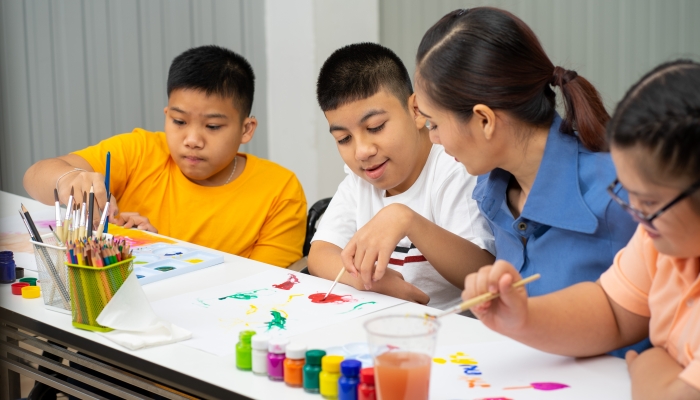
- A child is diagnosed with speech delay when they cannot form words or communicate as expected for their age.
- When a child isn’t talking by two years old and isn’t attempting to communicate in another way, through gestures or facial expressions, it might be an autism-related speech delay.
- Many children with a speech delay do not have an autism diagnosis.
- Understanding the difference between speech delays and autism-related speech delays will help your child get the right support.
- Early intervention strategies such as speech therapy will significantly help a child catch up on speech delays.
Have you noticed your child doesn’t talk as much as other kids his age? Or is your child not talking at all yet?
A mom approached me recently, concerned that her three-year-old wasn’t talking much. Moments earlier, he had taken my hand and pulled me to a toy he wanted to show me. Needing help, he mumbled an incoherent short word, signifying “up.”
Well-meaning friends and family had shared several ideas of what she could do better to help him talk. She felt guilty that she hadn’t done enough for him and worried that something else might be wrong. Like many parents of children with delayed speech, she wondered if her child had autism. It was clear her toddler struggled with speech, but speech delay, by itself, does not mean a child has autism.
Understanding the difference between a speech delay versus autism can help ensure your child gets the help they need. Early intervention with professionals will significantly help children catch up on delays.
Speech Delay vs Autism: Are They Related?
For some children, a speech delay can be an indicator of autism spectrum disorder (ASD), but a speech delay by itself does not mean a child has ASD. Autism-related speech delays typically occur with other concerns involving social skills, learning, communication, and behavior struggles.

What is a Speech and Language Delay?
Speech and language delays occur when a child has a hard time developing speech or language skills. Children go through stages of language development in the first three years of life. There are different types of speech and language disorders such as:
- Articulation disorders: inability to say certain speech sounds correctly
- Stuttering: problems with the flow of speech
- Apraxia: inability to say what you want consistently and correctly
If a child is trying to communicate but it’s difficult to understand what they say, it’s considered a speech delay. A child might struggle with sound development. Children that struggle with speech development produce sounds and typically use words to communicate but they are hard to understand. This is most noticeable around 18 months to 2 years old.
A language delay impacts what a child says or understands instead of how they say it. If a child can say words clearly but struggles to combine words logically they have an expressive language delay. Your child can correctly pronounce sounds but the sentence does not make sense.
If a child has difficulty understanding others, they might have a receptive language delay or difficulty with language comprehension. This means the child struggles to comprehend verbal communication.
What are the Signs of Speech Delay?
There are different signs of speech development to look for in your young child. Recognizing early signs of speech language disorders increases the chance of early intervention. Many children can overcome a speech or language delay with early intervention techniques and speech therapy. Signs of speech and language delays include:
| Newborn |
|
| 9 Months |
|
| 12 Months |
|
| 15 Months |
|
| 18 Months |
|
| 2 Years |
|
This list of signs of speech and language delays is not comprehensive. The Centers for Disease Control and Prevention (CDC) shares more detailed, brief milestone screeners you can use with your children.
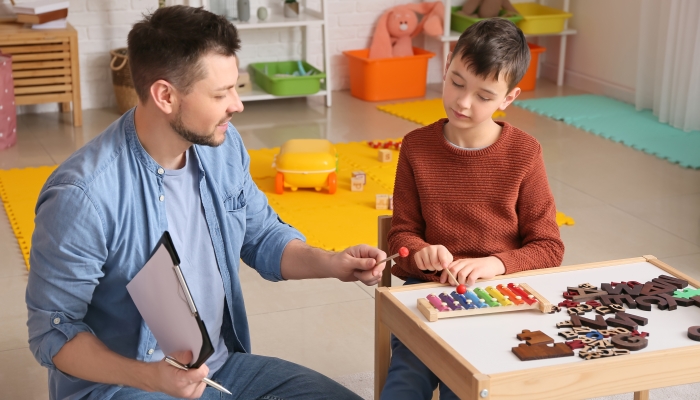
What is Autism?
Autism spectrum disorder is a neurological disorder that impacts social skills, learning, communication, and behavior.
A speech delay and autism might coincide, but other signs of autism include:
- Avoiding eye contact
- Not responding to their name
- Repetitive behaviors
- Delayed movement skills
- Showing limited or no interest in interacting or communicating with others
A professional must diagnose an individual with autism, but parents can utilize developmental milestone screeners, like the CDC’s signs and symptoms of autism spectrum disorders, to screen for signs of autism.
Can a Child Without Autism Have a Speech Delay?
Speech delays are common in children with autism spectrum disorder but are also common among children without autism.
If your child is engaging with you and communicating without words, it’s likely they do not have an autistic speech delay. Instead of single words, a child might communicate through gestures, body language, and babbling.
What are Other Reasons for Speech Delay?
If you’re concerned about your child’s speech delay, seeking professional help can rule out other reasons that might contribute to your child’s speech delay. These reasons might include:
- Hearing loss, sometimes caused by chronic ear infections
- Expressive language disorder
- Brain injury
- Oral impairment or oral-motor problems such as lip/tongue tie or feeding issues
- Selective mutism
- Cerebral palsy
In addition to these possible reasons, some children are just late talkers. There might not be a specific reason contributing to their speech delay. When a child still attempts to communicate with others it’s often considered being a “late talker” and not an autism-related speech delay.
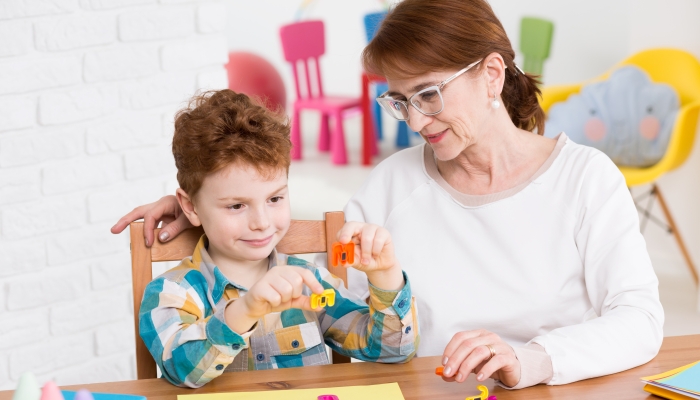
When Does Speech Delay Mean Autism?
When a child isn’t talking by two years old and isn’t attempting to communicate in another way, like through gestures or facial expressions, it might be an autism-related speech delay. Early indicators of autism can be identified at 18 months or younger, but most screening tools are reliable at two years old.
In addition to the signs of speech delay above, speech related signs of autism include:
- Limited engagement or interaction with others
- Using few or no gestures
- Flat, toneless speech or exaggerated, hyper speech
- Excessive repetition of words or phrases
How to Tell the Difference Between a Speech Delay and Autism
One of the key differences between speech delays and autism-related speech delays involves social communication skills. A child with speech delays is highly motivated by social responses, interactions, and attention. They will mimic others and try to engage. A child with a speech or language delay is slower to reach milestones but will follow typical developmental patterns of peers.
Non-Verbal Communication
Typical communication milestones begin at birth when a newborn attempts to interact and engage with those around them. Early signs of speech delays and possibly autism include nonverbal communication skills of eye contact and facial expressions that start as an infant.
Children with autism rarely make eye contact and tend to avoid direct eye contact. Instead of pointing or showing interest in objects, children with autism don’t develop or are slow to develop gestures and facial expressions. Children with autism also tend to struggle with understanding non-verbal communication.
Verbal Communication
Children with a speech delay will try and engage others in interactions. Children with autism, however, typically do not seek out interactions. A child with ASD is either slow to respond or doesn’t respond when his name is called or when someone is trying to get his attention.
Children produce sounds and attempt to imitate speech sounds around 6–12 months. A child with an autistic speech delay typically does not imitate speech sounds by 6–12 months. Some children with ASD develop speech at a regular rate or learn a few words. You might notice a child with ASD repeating these words repetitively, which is called echolalia.
Behaviors
Children with speech delays commonly interact and move like other peers. They tend to enjoy engaging in pretend play and interacting with other children.
Children with autism sometimes have repetitive behaviors and movements. They might spin in circles or flap their hands repeatedly. Sometimes children with ASD hyperfocus on a particular activity and have intense interests. They rarely engage in pretend play and focus more on independent play and their own interests.

When to Seek Professional Evaluation for Your Child’s Speech Delay
Early intervention is important for any delay in children. If you notice any of the early signs of speech delay mentioned above talk with your pediatrician as soon as possible. Children that receive early intervention strategies have a greater chance of catching up with peers.
If you have speech concerns, your pediatrician will likely refer you for a speech-language pathologist (SLP) evaluation. Speech-language pathologists will utilize special tools to determine the specific language or speech concerns your child has. These speech and language development tests will focus on:
- Receptive language delay or what your child understands
- Expressive language delay or what your child can say
- Sound development
- Speech motor disorder
- Oral-motor skills
Based on the results of these tools, your speech-language pathologist will create a treatment plan that best supports your child’s unique needs. Since speech delays differ, your child’s treatment plan will focus on your child’s development. This will likely include speech therapy to help improve communication skills.
Speech therapists will focus on oral motor and fine motor skills. Your child may learn a nonverbal language, or sign language, as a way to increase interactions.
Collaborating with the speech therapist will further support your child’s ability to catch up on speech and language concerns. Children respond positively when parents regularly practice and implement the strategies they learn in therapy.
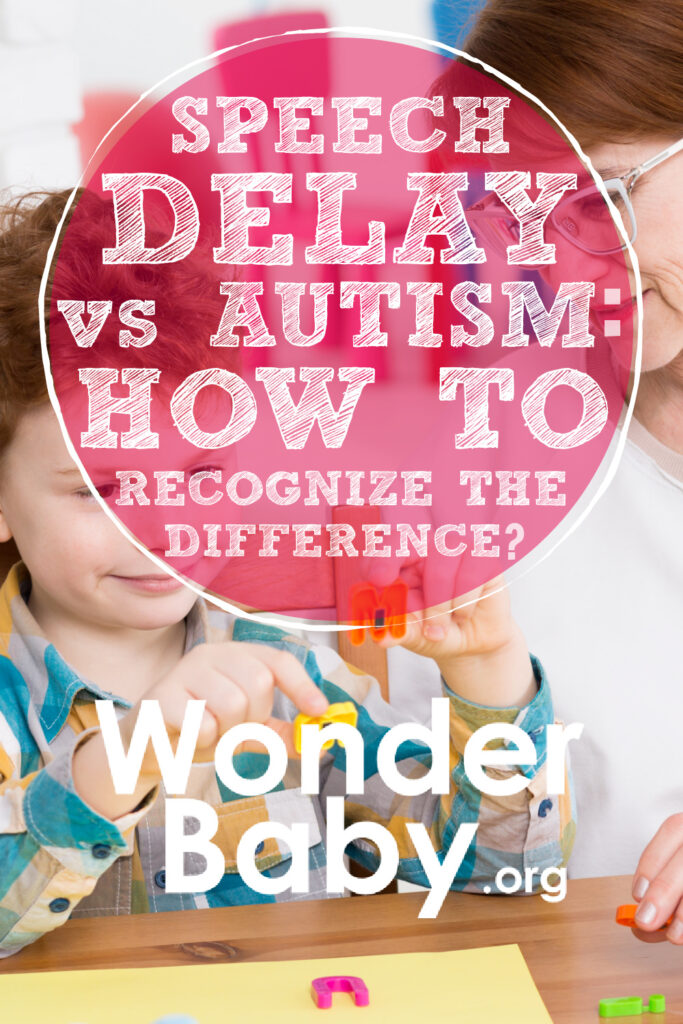
Related Posts
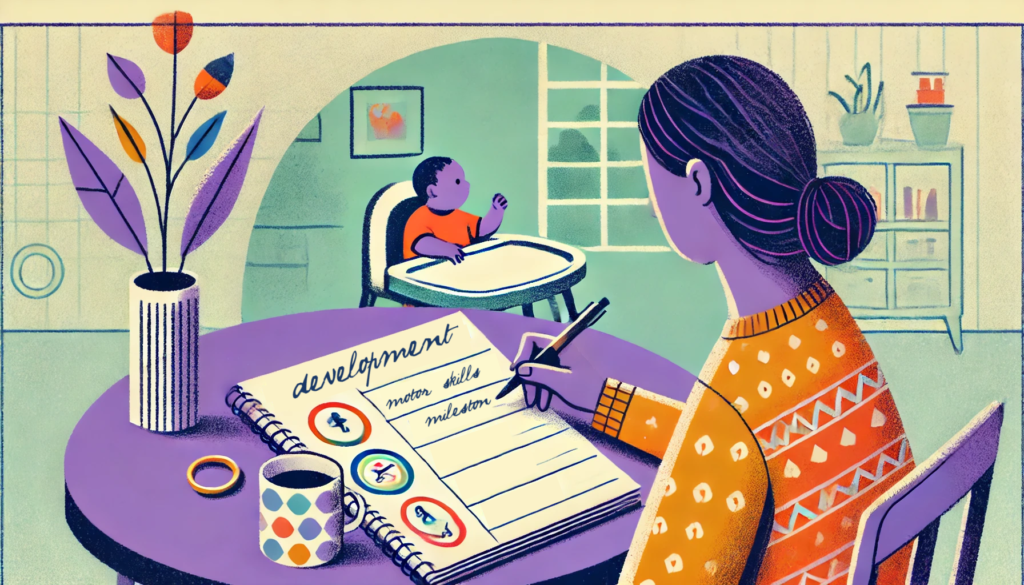
Development, Special Needs
How to Track Milestones for Developmentally Delayed Babies
Parents of developmentally delayed babies can explore practical tools and strategies to track milestones, celebrate progress, and support their child’s unique developmental journey.

Fine and Gross Motor
5 Alternatives to Tummy Time for Babies with Motor Development Challenges
Does your baby struggle with tummy time due to motor development challenges? These alternatives to tummy time will offer the same benefits.

Development
Should Twins Share a Room?
Wondering if your twins should share a room? We’ll explore the pros and cons of room-sharing for twins right here before you make your decision.